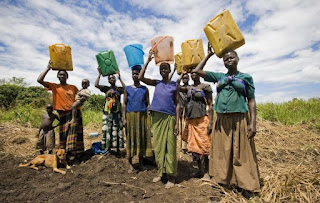Conclusions and Reflections
I have enjoyed learning about water and gender (I hope you have to), and although I have only scraped the surface, I hope I gave you enough InSite into water and development. My initial thought was that I hadn't showcased female happiness and that I had fallen into the trap of seeing African women as victims at the disappointment of Winanna. However, at closer look, I have shown how women can be agents of change with vital water knowledge that can boost Africa's development.
I hope I have illustrated the importance of empowering women to become leaders in development and climate change. Policies and talks, such as the SDGs and COP27, are understanding not only gender inequalities but also the vital importance of women in leadership, giving us hope for the future. However, something echoed throughout my blog is the need for women to be empowered locally. If you had asked me at the start of this blog what would empower women, I would probably say infrastructure and policies; however, I have learnt to truly empower women, deep gendered-power relations that manifest in social and cultural norms in Africa must be overcome.
Reflections:
- When starting this blog, I only had ideas that climate change would harm women, and whilst that remains practically true, I have since learnt that it can also be a catalyst for women's empowerment.
- In the same breath as the point above, it is harmful to see women as tools or resources. Empowerment and gender equality must be translated into other aspects of their lives.
- Something else I didn't consider before was to empower women truly, men must be involved as it is them who can reduce power differences.
- This blog takes a "women-centric" response to gender. I have realised that this blog only focuses on women and doesn't address men or any other gender / trans people, which also needs to be explored.
- Lastly, I feel it is essential to state that African women are not homogeneous. Intersectionality of class, disability, marital status and local factors need to be acknowledged to understand different barriers.
 |
| Women from rural Kenya carrier water from a well |


Comments
Post a Comment